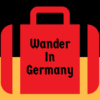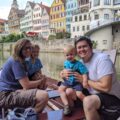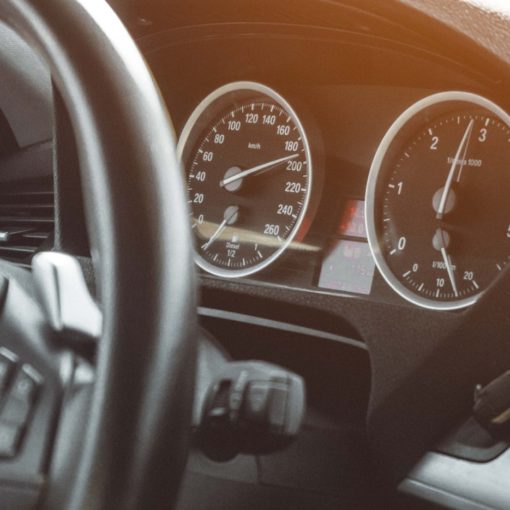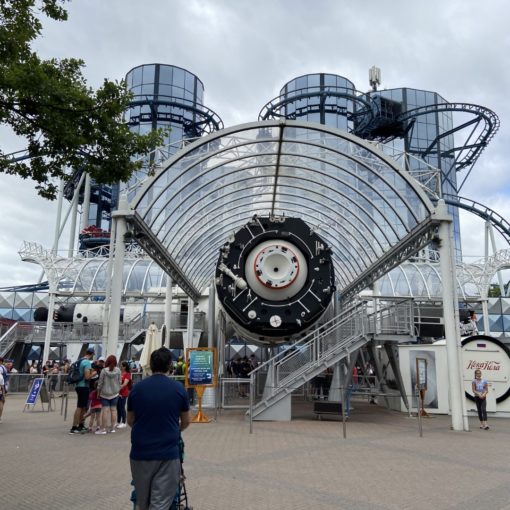[This post may contain affiliate links where we earn a small commission. Please see our disclosure for more information and thank you for supporting our site so we can continue to bring you awesome content for your travel inspiration!]
Heading to Germany soon and want to know a few of the basic German phrases for travel to help you get around, show that you are respectful of being in their country, or you just love to learn new foreign words or languages?? I’m not here to teach you German (that would be pretty hypocritical of me, after all since my own German is ATROCIOUS despite living here) but I do think it’s important that when you travel, you have even just a few of the German essentials memorized. The problem is that German travel words may very well vary depending on exactly where you go. Regardless though, I go into what to expect for how to communicate and what German tourist phrases I personally think are the most important for you to know.
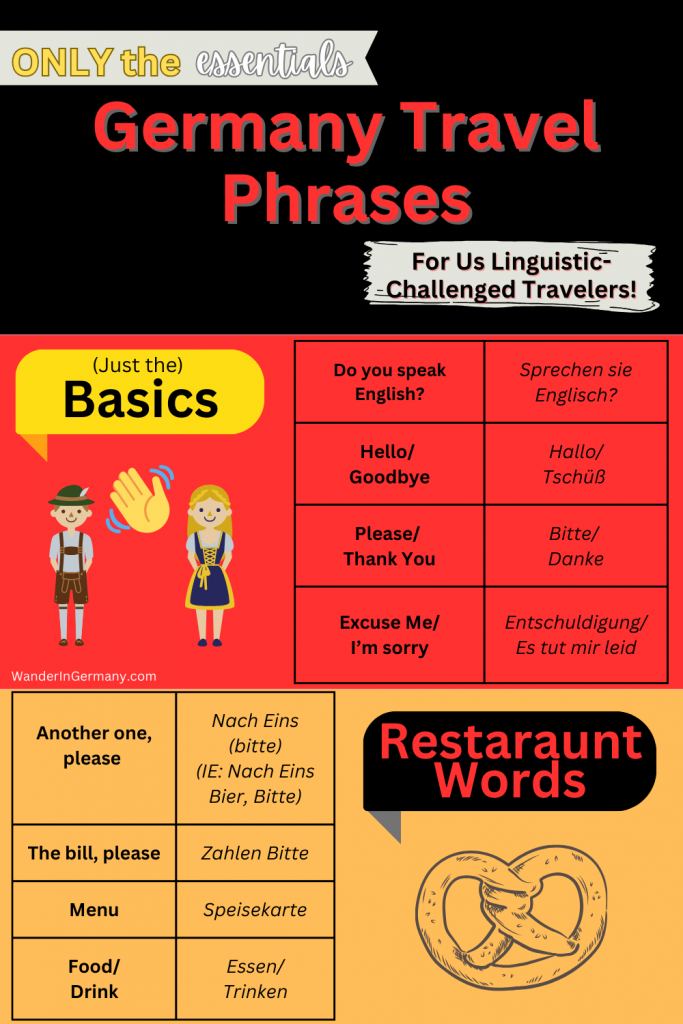
High German vs Local Dialects
I discuss if you actually need to know German to travel IN Germany in this article. And one of the main points that I make in there is that it is required curriculum in Germany for students to start learning English (here in Bavaria it starts in 3rd grade). While most kids that live in the small countryside villages will know and speak Bayerisch (or any dialect throughout the country), it is not officially taught in school.
Hoch Deutsch is the “proper” German and this is what is taught in schools. Therefore, while dialects may be used all over, your best bet is to always fall back to the “Hoch Deutsch” words (which is what any translator app will give you, anyway).
Dialects will Vary (Drastically)
I’ll never forget when I traveled to Frankfurt and asked for a “Salami Semmel” and they looked at me like I had 4 heads. At the time, I thought it was just my reeeeeaaaaaaally bad German but I later came to find out that the word “Semmel” (Roll/Sandwich) that we use everywhere here in Regensburg is actually a very Bavarian word and not spoken all over Germany!
When I took my first A1 German class, the teacher was from a teeny tiny village and she was explaining that she speaks Bayerisch (a very strong dialect in Bavaria). But then she was joking that even she can’t understand the Bayerisch in the next village over. You know, the town that is literally a 3 minute drive from the place that she grew up and has spent her entire life in! It was at this moment that I realized I was screwed for learning German. If a GERMAN can’t even understand other dialects, what hope do I have!?
However, as a general traveler, no matter where you travel that has dialect, if you say the “Hoch Deutsch” words, you will still most likely be understood. So, don’t worry about knowing 5 different dialects for where you go (because, like I said, it can actually literally change kilometer to kilometer!), and instead, just trust your Google Translate and the basic German travel phrases that apps like DeepL and Google Translate give you for Hoch Deutsch.
Local Phrases
Another thing to consider is that in some regions of Germany, they just have different phrases or slang for things. It’s not always necessarily a direct correlation to dialect per se (although, that often does come into play). A great example is the first time I traveled to parts of Northern Germany and people were greeting me with a phrase I had NEVER heard before in ALL of my travels of Germany. I knew that saying something like “Grüß Gott” or “Servus” was definitely something from Bavaria, so I knew to default instead to the more general, “Hallo” or even ” Guten Tag.” But when they started saying “Moin” (sometimes even just “Moi”) as a greeting I was legit confused and thrown off! Berlin is also known for having some of their own slang that is typically only spoken in that area.
My point is that having some very basic German words for traveling in your back pocket is absolutely never a bad idea. However, if you are traveling to various regions, just know that the common German phrases for traveling in one region may be quite different from another.
German Phrases for Travelers
The reality is there are plenty of phrases for travel in Germany that would be helpful to know. But let’s be real and let’s be honest with ourselves here. If you are reading this article, you probably are not here to learn German and if you are like me and your brain can only hold onto like, 3 foreign language phrases at a time when traveling, you don’t need a whole long, laundry list and dictionary! So, here are the very basic German phrases for travel. These are the ones that say, “Hi. I’m clearly a foreigner, but I respect you enough to at least pretend to attempt something in your language.” At this point, we aren’t even going for “Did I pronounce this correctly” (although, bonus points if you do!) this is simply a quick and dirty run down of common German phrases for travel that will help you not look like a jerk for just demanding everyone speak English around you.
Essential German Phrases for Travel
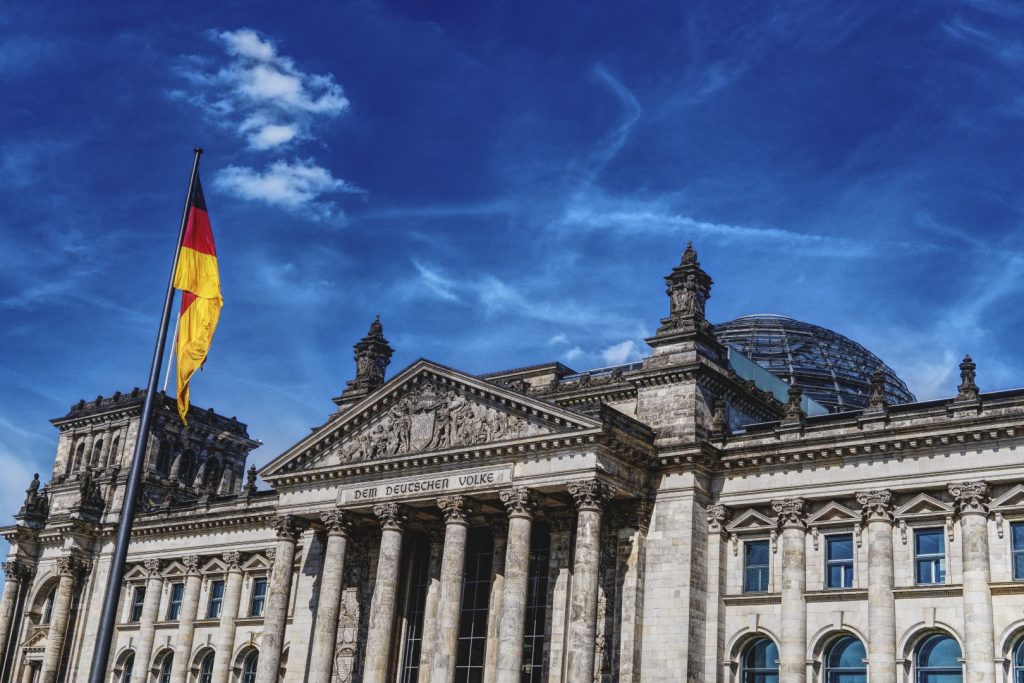
Use these simple German words as the bare minimum when traveling in Germany.
| Sprechen sie Englisch? | Do You Speak English? |
| Bitte/ Danke | Please/ Thank You |
| Entschuldigung | Excuse Me |
| Es Tut Mir Leid | I’m Sorry |
| Wo ist… ? | Where is… |
| Nach Eins | Another One (IE: Nach Eins Bier Bitte) |
| Zahlen Bitte | The Bill Please |
| Was kostet das? | What Does This Cost? |
Since we’re here for the basics, I won’t judge you, if you don’t judge me? Mmmk? Click on the play button to hear what a typical tourist can say the common German phrases.
Hallo/ Local Greeting
Say It Like: “HA-low“
The first word you need to know when traveling to ANY foreign country is the basic greeting! Luckily for us, a very standardized way to greet people no matter what region in Germany you are visiting is super easy for English Speakers. “Hallo!” is so close to “Hello!” that you are sure to remember this one. And while saying “Hallo” whether you are in Berlin or in the Alps is going to be 100% acceptable, it is still nice to know what the local greeting is (if for no other reason than when it’s said to YOU so that you’ll know what it is!). Here are a few regional ways you can expect to be greeted in Germany:
Bavaria: Servus, Grüß Gott (that silly looking letter is a double “S” so it is pronounced like “Groos Got”), Grüezi
Other Southern Germany: Grüezi, Grüß Gott
Central Germany: Guten Tag
Northern Germany: Moin/ Moi
Depending on the exact local dialect, most greetings will then take some shape or form from these basic “Hellos.” For example, in some places in the state of Hessen, they just basically gargle the word, “Gut” into the word, “Guude” as a hello. Or in areas along the French border, there may be variations of “Tag” (shortened for “Guten Tag) such as “Tach” for their greeting. Again, the point is that you don’t need to know all of these, but to have a basic prior knowledge of the base words is good so that when someone says to you, “Tagchen” you’ll know “Oh, hey, they are saying hello to me”
Example: “Hallo!” (As you walk into a store)
Sprechen Sie Englisch?
Say It Like: “Shhprek-in Zee Eng-lish?“
Let’s go in order of importance for this next phrase. You’ve now said “Hallo” to the hotel receptionists, the bus driver, or whomever. But now you need to actually communicate something. Maybe you need to check in to your hotel. Or maybe you have a question about a food item on a menu. You’re next “Must Know” German phrase is simply, “Sprechen Sie Englisch?” Do you speak English? If they say no, then fall back on your Google Translate App (seriously, it can be a life saver!) and if they say, “Ja. Naturlich” then know that it is acceptable to switch the conversation to English.
Insider Tip: Many Germans are actually a bit self conscious of their English abilities. Many will say they can’t speak German or “only speak a little” and the reality is that they can speak wonderfully! (Far better than my butchered German, at least!!) But if they say they only speak a little, try to meet them in the middle with as much as you can manage in German, or, again, simply whip out your Google Translate App.
Example: “Hallo! Sprechen Sie Englisch?” (When you walk into a restaurant, hotel, etc)
Tchüss
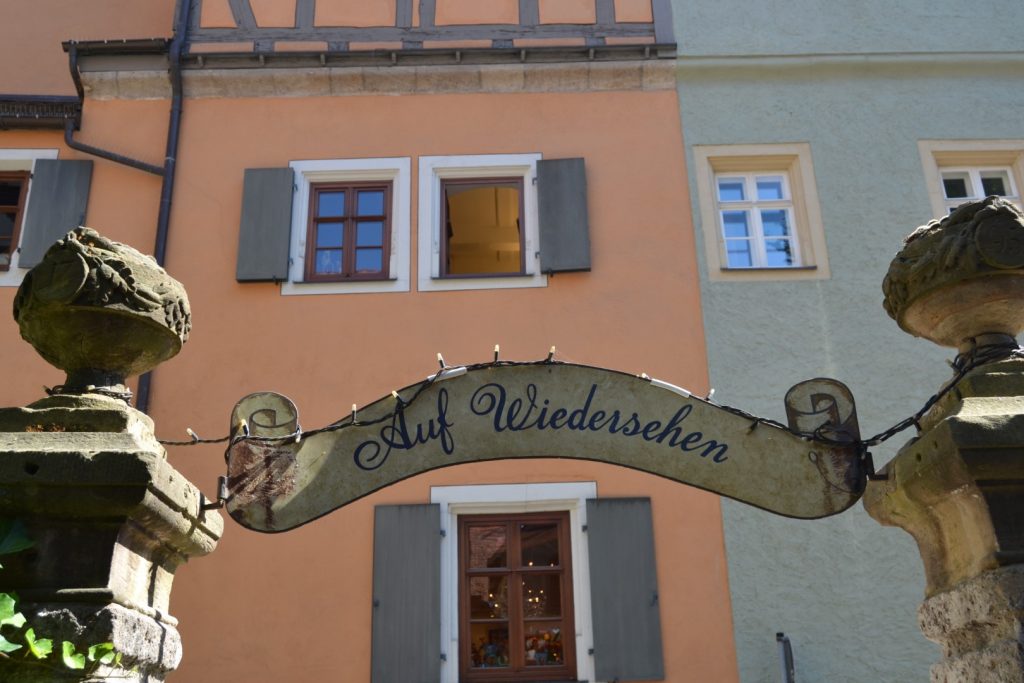
Say It Like: “Choose!” (but quick)
While I said before that “Hoch Deutsch” can always be your default, one area that I find most people no longer actually use the “High German” phrase is when saying, “Goodbye.” As stereotypical as the word, “Auf Wiedersehen” is when you imagine Germans, it’s actually not super commonly used! Granted, if you do say, “Auf Wiedersehen” as you leave somewhere, it’s not like anyone will think anything wrong with it.
However, it’s much more common for people to use the word, “Tchüss” for goodbye and even the Italian word, “Ciao!”
Example: Tchüss! Schönen tag! (Goodbye have a nice day!) (As you leave a restaurant)
Ja/ Nein
Say It Like: “Ya“/ “Nine“
Again, luckily these two phrases are pretty darn easy to memorize and remember. Knowing how to say “Yes” and “No” is just a nice thing to be able to say. It can be as simple as the waitress asking you if you are ready to order and you say, “Ja. I’d like a Schnitzle please” Sure, you switched to English immediately. But again, the purpose of knowing the most essential German travel phrases is not to be conversing at this point, but instead to be more of a sign of respect in a foreign country.
Example: Haben Sie eine Reservierung? – “Ja”
Bitte/ Danke (Schön)
Say It Like: “Bit-uh”/ “Dahnk-uh” (Shoe-un)
Just like with Ja und Nein, knowing how to say “Please” (Bitte) and “Thank you” (Danke) is the very least we can do as tourists. I don’t care what language you are speaking or what country you are in, we all know that the basics of politeness can get you quite far in life! Even if you are just saying, “Danke” as you leave a restaurant or if you can manage an “Ein Bier, Bitte” it’s a simple gesture to show you are trying.
Note: Schön saying the word “Schön” is like giving the word more emphasis. Think of it like saying “Thanks!” vs “Thank you so much!”
Example: “Ich mochte das Schnitzle und Pommes, bitte.” or “Danke Schön für die Hilfe!”
Entschuldigung
Say It Like: “Ent-shool-di-goon“
Knowing how to say, “Excuse me” is one of the main go-to travel phrases. Whether you accidentally bumped into someone on the bus, or need to pass a little old Oma walking slowly on a sidewalk, being able to say, “Entschuldigung” is just the polite thing to say. But perhaps the place where you might be surprised to use it the most is at restaurants. Many people get the impression that Germans can be a bit stand off-ish or even that service at restaurants are lacking and that the servers are rude. That’s not true at all. Germans just very much respect your privacy and time. At restaurants, you’ll want to get used to saying, “Entschudligung” with a polite little wave to the server, because it’s standard that they don’t come to you unless they’ve been asked. Just simply get the waiter’s attention with an “Entschudligung” and then kindly ask for what you need (some ketchup, another drink, the bill. etc….)
Example: “Entschudligung, kannst du hiflen?” (Excuse me, can you help?)
Es Tut Mir Leid
Say It Like: “Es toot mare lide“
I’ll put “I’m sorry” as a subtext to “Excuse me” because in Germany, saying, “Entschuldigung” is just as acceptable as “I’m sorry” for a plethora of cases. If you bumped into someone, if you are apologizing for not knowing how to speak German, etc saying, “Entschuldigung” is just fine. So, if you are looking at minimizing the amount of common German phrases for travel to know, you can probably skip this one.
Example: “Es tut mir Leid, Ich spreche kein Deutsch” (I’m sorry, I don’t speak German) “Entschudligung, Ich spreche kein Deutsch” (also the same meaning)
Wo ist… ?
Say It Like: “Voh Ist…“
Now, I know not everyone has the world’s smallest bladder like me, but one of the first phrases I ever learned when traveling in Germany before I moved here was, “Wo ist die Toilette?” If that’s not as big of a concern for you (lucky you!), then still knowing how to ask, “Where is the….” is still a very helpful travel phrase to know. For example, even though I now live in Germany, I still sometimes have to ask for help when traveling for things like “Wo ist the Bus Stop?” or, “Wo ist die Bahnhof?”…and yes, I still have to regularly ask, “Wo ist die Toilette?”
Example: “Wo ist ein Geldautomat?” (Where is an ATM)
Insider Tip: Bathroom Edition
Since we are on the topic of bathrooms and German travel phrases, a few things to note:
Toilette: I felt really weird asking for “The toilet” when I first moved here. It sounded a bit crass and not very polite. However, that is the most common way to speak about a “Restroom” in Germany.
Say It Like: “Toy-lett-uh“
WC: This literally stands for “Water Closet” but if you ask “Wo ist die WC?” you are more than likely going to get a few funny looks, even though many signs on the bathrooms say WC! Just use the word “Toilette” instead.
Say It Like: “Vay- Say“
Damen/Herren: You’ll probably find yourself in a predicament at some point as you stand in front of the bathroom doors in a public building trying to remember which one you need to go into. Luckily, Germans often have silly little pictures on the bathroom doors, like a lady in a Dirndl on the “Women’s” bathroom so it’s typically pretty easy to figure out. But if not: Damen= Women/ Herren= Men
Say It Like: “Dahmen/ Hair-en“
Nach Eins
Say It Like: “Knock Eye(ns)“
This may be an important one if you plan on eating out often on your trip to Germany. For example, if I finished my Dunkles Bier, I could just point to the mug and say, “Nach Eins (bitte).” It is the most simple way to tell the server that you would like “Another one.” This can be applied to most things at a restaurant as well. Sure, you could go the extra step to say the actual word you need (Ketchup, Helles Bier, etc…) but at it’s simplest form, pointing and saying, “Nach Eins, bitte” is a great start for a traveler.
Example: “Nach Eins Bier, bitte” (Another beer please)
Zahlen Bitte
Say It Like: “Tsah-len Bit-uh”
The first time I traveled to Germany, in my German Phrases for Travellers pocketbook, it said, to ask for “Die Rechnung (bitte)” when you are ready to ask for “The Bill” and while “Rechnung” is also 100% correct, for some reason, I could just never remember that word on the spot! If you are looking for an easier (and still absolutely acceptable) way to ask for the bill, you can simply politely wave down the server (they do NOT bring it to you automatically) and just say, “Zahlen Bitte?”
Just be sure you know the proper Tipping Etiquette in Germany
Example: “Entschudligung. Zahlen Bitte?” (Excuse me, may I have the bill please?)
Was Kostet Das?
Say It Like: “Vas Cost-it Dahs?“
If you plan on shopping for things like the Best German Souveneirs, then you may need to know how to ask how much something costs. Typically, the prices are all on items, but in the off chance it’s not, being able to ask “Was Kostet Das?” is a polite ice breaker. That means they may answer in German, though! But no worries, you can just ask them to type it out on your phone if they can’t speak English.
Example: “Entschudligung. Was Kostet Das?” (as you point to an item) (Excuse me, what does this cost?)
Other Good German Travel Vocabulary To Know
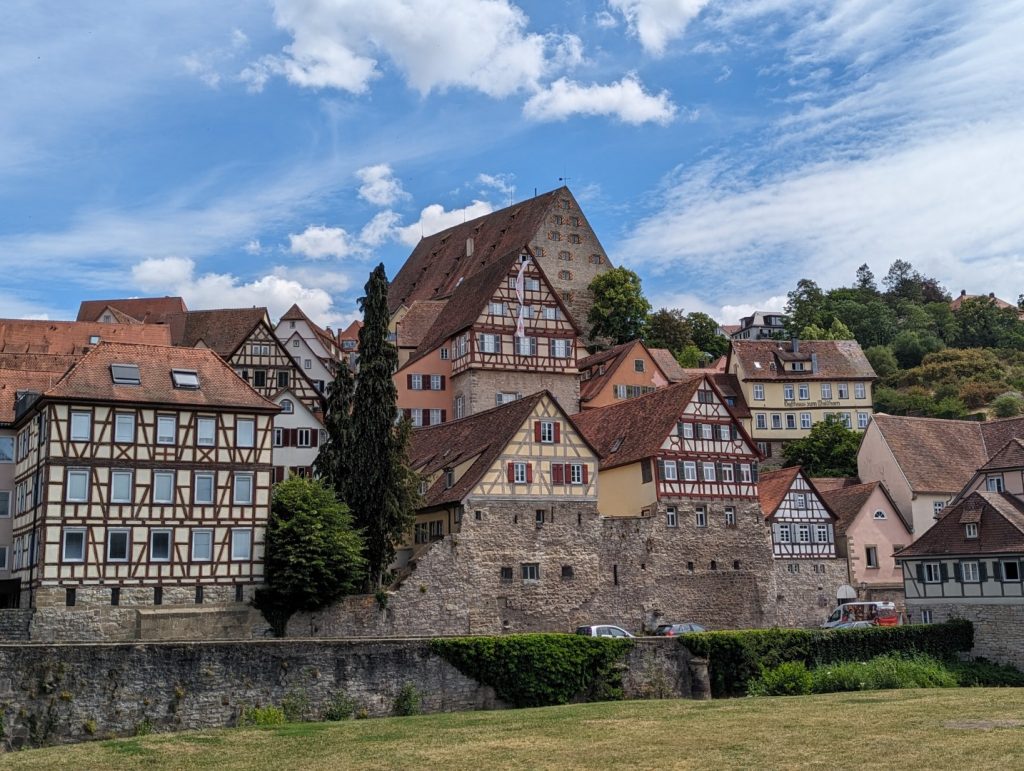
Whether you aced your Duo Lingo practices before you boarded the plane or if you just feel like you’ve got a good memory and got the above phrases locked and loaded, there are still a few more simple German phrases that will be helpful for you to know.
Ich spreche kein Deutsch: “I don’t speak German”- This just may be one of the most useful German phrases for travel if you don’t speak German!
Nimmst Du Karte?: “Do you take Credit Cards?” – While people still argue that “Cash is King” in Germany, credit cards are becoming more and more common, although it’s never a guarantee. “Nimmst Du Karte?” is one of my personal go-to phrases when out and about in Germany.
Ich Habe…: “I have…” For example, “Ich habe eine Reservierung” (I have a reservation). You can also ask, “Kann Ich Habe…” (May I have…)
Trinken: “Drink” For example, a server will ask you “Was möchten Sie trinken?” (What would you like to drink?) pretty soon after you sit down.
Genau: “Exactly.” I often joke that if you don’t know what word to say in German, just say, “Genau.” It’s like the classic filler and a common way to say, “Of course” “Yes” “Exactly” etc…
Gerne: “Gladly” You’ll typically hear this when you say Danke to something, like someone holding a door open, a server handing you a drink, etc
Ich Schaue Nur: “I’m just looking” For example, if you are at a store doing some window browsing.
